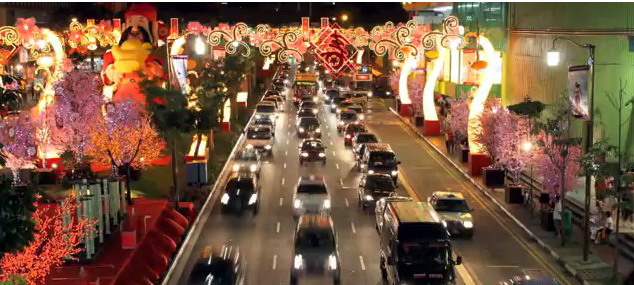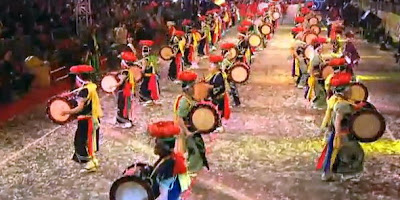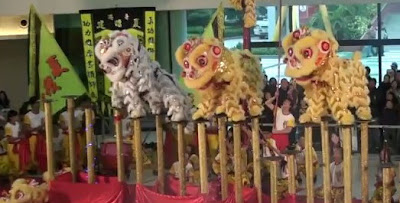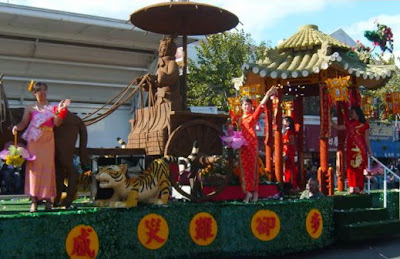Chinese people celebrates on February 3th, the beginning of 2011 Lunar New Year: "Beginning of new year, end of the old year / xin nian tou, jiu nian wei", this year starting the "Year of the Metal Rabbit". It is expected to be a peaceful year, which will bring good luck, calm and wealth around the world (characteristics of rabbit animal sign) and strength and forceful energy to pass over bad periods (characteristic to Metal influences).
In traditional Chinese Culture, the Chinese calendar is cyclical that repeats every 60 years. There are 12-year cycle of the animal zodiac (鼠 Rat, 牛 Ox, 虎 Tiger, 兔 Rabbit, 龍 Dragon, 蛇 Snake, 馬 Horse, 羊 Sheep, 猴 Monkey, 雞 Rooster, 狗 Dog, 豬 Pig), with five elements of Chinese astrology (Wood, Fire, Earth, Metal and Water) having yin / yang associations alternating every year. The first day of New Chinese Year starts on second new moon after the winter solstice and is celebrate at a various date every year (between 20 January - 20 February). Lunar New Year is based on a lunar (or lunisolar) calendar that refers to the beginning of the year in several cultures.
 |
| Singapore 2010 celebration of Chinese New Year |
The 2011 Lunar New Year celebrations this year, fall on February 3th day of the Gregorian year (except Tibetan) and gain different names, although they are somehow related to Chinese Lunar New Year celebrations:
- The beginning of Japanese Lunar New Year is Shogatsu or Oshogatsu 正月, (since 1873 the Japanese accepted the solar calendar).
- The Koreans celebrate Korean Lunar New Year / Eum-nyeok Seolnal 음력설날 .
- The Tibetans will celebrate around the world "Losar / ལོ་གསར་ This year begin "female iron Hare" year on March, 5th.
- The Mongolians will celebrate Tsagaan Sar / Цагаан сар / white moon.
- Vietnamese Lunar New Year is named "Tet Nguyen Dan / Tết / Feast of the First Morning" and usually is celebrate as same date as Chinese New Year.
"All creations are reborn on New Year's Day" Chinese proverb.
So, in this evening, all over the world the "Chinese New Year Eve" called "Chu Xi 除夕" having the meaning "discard the old, welcome the new" (although " Chu 除" means discard, removal and " Xi 夕" means night).
 The New Year's Eve of the Chinese New Year is celebrated with festive clothing (red, orange), festive paper decorations (usually with good wishes written on them) in home and garden and a family feast - having many similarities with the American Thanksgiving Day.
The New Year's Eve of the Chinese New Year is celebrated with festive clothing (red, orange), festive paper decorations (usually with good wishes written on them) in home and garden and a family feast - having many similarities with the American Thanksgiving Day.It is that time of the Year when ancient Chinese traditions are honored in each corner of China and in many countries with significant Chinese populations (even they recognize or not the Chinese National Holiday).

The most major celebrations will be held next weekend February 5th -6th, but the festivities will probably consist of about 2 weeks / every day events throughout Chinatowns and spectacular parades with traditional colorful silk costumes, Chinese dragons and lions dancing on traditional or contemporary Chinese music.
At the midnight of "New Year Eve", the sky will be lighten by the traditional fireworks / firecrackers and in the last Day of Celebrations people will enlighten the streets with traditional Chinese lanterns during the "Lantern Festival / Yuan Xiao Festival/ 元宵节" (it is first night of the year to see a full moon).
Not only Chinese traditions are honored this evening, other cultures are preparing their own Spring Festivals and National Holidays:
- Japanese will celebrate Japanese New Year Eve / Ōmisoka (大晦日) and once the new year starts people wish each other "良いお年を / akemashite o-medeto / Happiness on the beginning of a new year"
- Traditional Koreans wishes for the Lunar New year is: "새해 복 많이 받으세요 / saehae bog manh-i bat-eu saeyo / Happy New Year".
- The Mongolians will celebrate on February 3th-5th the "Bituun / Dark Moon" and the beginning of "female iron rabbit" year.
- The Vietnamese will wish each other " Chuc mung nam moi / Happy New Year" and "An khang thinh vuong / 安康興旺 / Security, good health and prosperity".
- The Tibetans will celebrate after a month their New Year's Eve and a traditional greetings used on this occasion is "Tashi Delek / zhaxi dele / Blessings and good luck in new year".
 |
| Japanese dance New Year Eve |





No comments:
Post a Comment